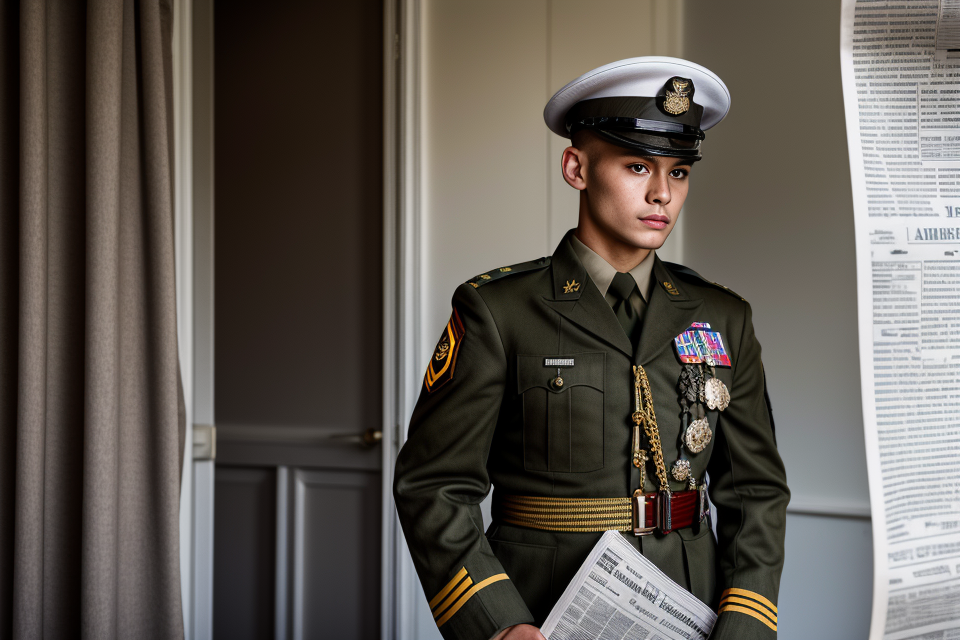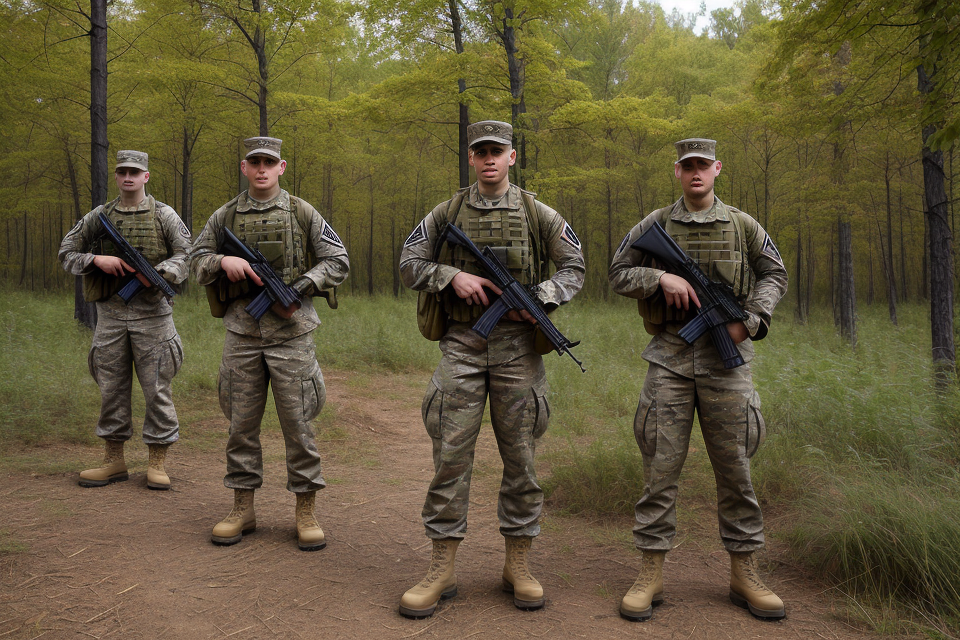
Why do army guys wear their uniform everywhere? It’s a question that has puzzled many people, and the answer may surprise you. Uniforms in the military serve several purposes, including identification, unity, and discipline. However, the decision to wear the uniform outside of the base or duty station is a personal one that may depend on a variety of factors. In this article, we’ll explore the reasons why some military personnel choose to wear their uniforms in civilian settings and what the rules and regulations are regarding this practice.
Army personnel often wear their uniforms both on and off duty as a way to maintain a professional and consistent appearance. This helps to establish a clear distinction between their military and civilian lives, and also serves as a way to show respect for the uniform and the role they have been given. Additionally, wearing the uniform can help to build camaraderie and a sense of belonging among service members, and it can also help to establish a sense of discipline and structure. In some cases, service members may be required to wear their uniforms in certain situations, such as when they are on duty or when they are representing the military at public events.
Reasons Behind the Uniform Policy
Military Code of Conduct
Dignity and Respect
The military code of conduct is an integral part of the army’s culture, and it emphasizes the importance of maintaining dignity and respect at all times. One of the primary reasons why army guys wear their uniform everywhere is to show their pride in serving their country and upholding the values of the military. The uniform represents the sacrifice and dedication that these individuals have made to protect their nation’s interests.
Wearing the Uniform with Pride
Wearing the uniform with pride is a sign of respect for the army and its traditions. Army guys take great pride in their uniform, which is a symbol of their commitment to the military and their country. They understand that the uniform represents the trust that their fellow citizens have placed in them to defend the nation’s interests. As such, they are expected to wear the uniform with dignity and honor at all times.
Showing Respect to Superiors
Army guys also wear their uniform with pride to show respect to their superiors. The military is a hierarchical organization, and soldiers are expected to show respect to their superiors at all times. Wearing the uniform is a way of demonstrating this respect and adhering to the chain of command. By wearing the uniform, soldiers demonstrate their willingness to follow orders and their respect for the authority of their superiors.
Overall, the military code of conduct emphasizes the importance of maintaining dignity and respect at all times. Army guys wear their uniform everywhere as a way of showing their pride in serving their country and upholding the values of the military. The uniform represents the trust that their fellow citizens have placed in them to defend the nation’s interests, and it is a symbol of their commitment to the military and their country.
Tradition and History
Preserving Heritage
The uniform serves as a symbol of the military’s heritage and tradition. It represents the sacrifices and achievements of the men and women who have served in the armed forces throughout history. The uniform is a tangible connection to the past, and it is worn with pride to honor the legacy of those who came before.
The Significance of the Uniform
The uniform is more than just a set of clothes; it is a symbol of the soldier’s commitment to duty and service. It represents the highest ideals of loyalty, duty, respect, selfless service, honor, integrity, and personal courage. These values are instilled in every soldier from the moment they put on the uniform, and they are expected to uphold these principles at all times.
The Evolution of the Uniform
The military uniform has evolved over time to meet the changing needs of the soldiers. From the early days of warfare, the uniform has been designed to provide protection, identify friend from foe, and maintain discipline. Today’s uniform is designed to be functional, comfortable, and durable, while still retaining the traditional elements that make it unique.
Maintaining Discipline
One of the primary reasons for the uniform policy is to maintain discipline within the ranks. The uniform is a symbol of the soldier’s commitment to the military and to the mission. It is a reminder of the responsibilities and obligations that come with the role of a soldier.
Upholding Military Customs and Courtesies
The military has a long tradition of customs and courtesies that are upheld by the soldiers. These customs are a reflection of the respect and dignity that is afforded to all members of the military, regardless of rank or position. The uniform is a reminder of these customs and courtesies, and it is expected that soldiers will uphold them at all times.
The Importance of Adherence to Rules
The military is a highly structured organization that operates on a set of rules and regulations. The uniform policy is just one of the many rules that soldiers are expected to follow. Adherence to rules is essential for maintaining discipline and ensuring that the military operates efficiently and effectively. The uniform is a symbol of the soldier’s commitment to following these rules and regulations, and it is a reminder of the importance of discipline in the military.
Practical Reasons for Wearing the Uniform
Identification and Security
Easier Recognition in Combat Situations
- The wearing of the military uniform serves as a visual aid for soldiers to quickly identify friendly forces in high-stress combat situations.
- This allows for faster decision-making and more efficient coordination between units, which can be crucial in life-or-death situations.
Reducing Friendly Fire Incidents
- The visibility of soldiers in their uniforms helps to reduce the likelihood of friendly fire incidents, where soldiers mistakenly target their own or allied forces.
- By easily identifying their comrades, soldiers can avoid firing on them and reduce the risk of friendly fire casualties.
Identifying Enemy Infiltrators
- In addition to reducing friendly fire incidents, the uniform also serves as a means of identifying potential enemy infiltrators.
- In situations where soldiers are operating in hostile territory, it is important to be able to quickly distinguish between friendly forces and potential threats.
- The uniform provides a clear visual distinction between soldiers and non-combatants, making it easier to identify potential infiltrators and neutralize them before they can cause harm.
Security Measures in Military Installations
- The wearing of the uniform is also a security measure in military installations, both in combat zones and in peacetime.
- In bases and barracks, soldiers wear their uniforms to establish a clear visual distinction between military personnel and civilians.
- This helps to maintain security and prevent unauthorized access to sensitive areas, as well as to ensure that soldiers are easily identifiable in case of emergencies.
- Overall, the wearing of the uniform serves as a critical tool for maintaining security and safety in military operations, both in combat and non-combat situations.
Standardization of Equipment
Ensuring Readiness for Operations
The standardization of equipment is a critical aspect of ensuring readiness for operations in the military. When soldiers wear their uniforms everywhere, it ensures that they are easily identifiable as members of the military and that they are readily available to carry out their duties in the event of an emergency.
Streamlining Logistics
By wearing their uniforms everywhere, soldiers can easily access their equipment and supplies at all times. This streamlines logistics and ensures that soldiers are always prepared for any situation that may arise. In the event of an emergency, soldiers can quickly and easily access their equipment, which can help to save valuable time and lives.
Maintaining Combat Effectiveness
Wearing the uniform everywhere also helps to maintain combat effectiveness. When soldiers are in uniform, they are always prepared for combat, which can help to reduce the time it takes to mobilize and respond to threats. This can be critical in situations where every second counts, and quick response times can make a significant difference in the outcome of a conflict.
In addition, wearing the uniform everywhere helps to reinforce the importance of military discipline and ensures that soldiers are always aware of their responsibilities as members of the military. By wearing the uniform, soldiers are reminded of their duty to protect and serve their country, and this can help to foster a sense of pride and loyalty among the ranks.
Exceptions to the Uniform Policy
Off-Duty Wear
Relaxation of Dress Codes
While army personnel are expected to adhere to a strict dress code while on duty, there are instances where they are allowed to relax their attire. These exceptions to the uniform policy are typically applied during off-duty hours, when military personnel are free to engage in personal activities and enjoy leisure time.
Balancing Personal Freedom and Military Discipline
The decision to relax the dress code during off-duty hours is a delicate balance between granting military personnel the freedom to wear civilian clothing and maintaining the discipline and professionalism associated with the military. It is crucial to ensure that the soldiers maintain a level of respect and discipline even when they are not on duty. This is why certain guidelines are put in place to govern the type of clothing that can be worn during off-duty hours.
Civilian Clothing during Off-Duty Hours
The Need for Appropriate Attire
When military personnel are off duty, they are expected to wear appropriate civilian attire that is consistent with the standards of the military. This means that even though they are allowed to wear civilian clothing, they must still adhere to certain guidelines. The type of clothing that is considered appropriate will vary depending on the specific circumstances and the location where the soldier is off duty. For example, wearing revealing or suggestive clothing is generally not allowed, as it could be seen as disrespectful or unprofessional.
Overall, the decision to allow military personnel to wear civilian clothing during off-duty hours is a practical one that seeks to strike a balance between granting personal freedom and maintaining the discipline and professionalism associated with the military. It is important to ensure that soldiers maintain a level of respect and discipline even when they are not on duty, and this is why certain guidelines are put in place to govern the type of clothing that can be worn during off-duty hours.
Unauthorized Wear
Exceptions to the uniform policy are instances where an individual is not authorized to wear the uniform outside of official military duties. These exceptions include:
Penalties for Non-Compliance
Non-compliance with the uniform policy can result in penalties that range from disciplinary actions to legal consequences. These penalties are designed to maintain the integrity of the uniform and ensure that it is only worn in appropriate circumstances.
Disciplinary Actions
Disciplinary actions for unauthorized wear of the uniform can include:
- Written reprimands
- Verbal counseling
- Suspension from duty
- Demotion in rank
- Discharge from the military
Legal Consequences
In some cases, unauthorized wear of the uniform can result in legal consequences. This can include:
- Misdemeanors or felonies under the Uniform Code of Military Justice (UCMJ)
- Civilian criminal charges for impersonating a military officer
- Civilian criminal charges for wearing a military uniform without authorization
It is important to note that the specific penalties for unauthorized wear of the uniform can vary depending on the circumstances and the jurisdiction in which the individual is serving. However, it is always best to adhere to the uniform policy to avoid any potential penalties or legal consequences.
The Importance of Adhering to the Uniform Policy
Military Regulations and Discipline
One of the primary reasons for adhering to the uniform policy is the military regulations and discipline. The military has strict rules and regulations regarding the wearing of the uniform, and these rules are in place to maintain order, discipline, and a professional image. Military personnel are expected to follow these rules and regulations at all times, both on and off duty, to ensure that they maintain the highest standards of conduct and appearance.
Unit Cohesion and Esprit de Corps
Another important reason for adhering to the uniform policy is unit cohesion and esprit de corps. The military is a highly structured organization, and the uniform is a symbol of that structure. Wearing the uniform is a way for military personnel to identify with their unit and their fellow soldiers. It fosters a sense of belonging and unity, which is essential for maintaining a strong and effective military force.
Public Relations and Recruitment
The military uniform is also an important tool for public relations and recruitment. The military relies on its image and reputation to attract new recruits, and the uniform is a key part of that image. When military personnel wear their uniform in public, they are representing not only themselves but also their unit and the military as a whole. They are ambassadors for the military, and their behavior and appearance can have a significant impact on how the military is perceived by the public.
Safety and Identification
Finally, the military uniform is also important for safety and identification. The uniform is designed to be durable and functional, with features such as pockets, Velcro, and zippers that make it easy to access essential equipment and supplies. In combat or other hazardous situations, the uniform can be a lifesaver, providing protection and identification. Wearing the uniform is a way for military personnel to identify themselves as members of the military and to ensure that they are treated as such in emergency situations.
Balancing Tradition and Practicality
When it comes to the exceptions to the uniform policy, it’s important to consider the balance between tradition and practicality. On one hand, the army has a long-standing tradition of wearing the uniform with pride and honor. On the other hand, there may be practical reasons for allowing some exceptions to the policy.
For example, in certain combat situations, it may be necessary for soldiers to wear non-standard uniforms in order to blend in with the local population or to carry out their mission effectively. In these cases, the army may allow soldiers to wear non-standard uniforms, such as those of the local police or military forces.
Another example of balancing tradition and practicality is when it comes to religious or cultural beliefs. In some cases, soldiers may require accommodations to their uniform policy in order to observe their religious or cultural beliefs. For example, a soldier may require a modified uniform to accommodate their religious dress code, such as a hijab or yarmulke.
Overall, the decision to make exceptions to the uniform policy must be carefully considered, taking into account both the tradition and practicality of the situation. The army must strike a balance between maintaining its traditions and values, while also being flexible enough to accommodate the needs of its soldiers.
Upholding the Proud Legacy of the Military Uniform
The military uniform is a symbol of pride and honor for those who serve in the armed forces. It represents the commitment and sacrifice made by service members to protect and defend their country. For many soldiers, wearing the uniform is a way to show respect for the tradition and history of the military, as well as a way to show appreciation for the sacrifices made by those who came before them.
The military uniform has a long and storied history, dating back to the early days of organized armies. Over the centuries, the uniform has evolved to meet the changing needs of soldiers, but it has always served as a symbol of strength, unity, and pride. Today, the military uniform is a recognized and respected symbol of the armed forces, and it is upheld as a proud legacy by those who wear it.
In addition to its historical significance, the military uniform also serves as a reminder of the responsibilities and duties that come with serving in the armed forces. It is a symbol of the trust and respect that the public has for those who wear it, and it is a reminder of the important role that the military plays in protecting the nation.
Overall, the military uniform is a source of pride and honor for those who serve in the armed forces, and it is upheld as a proud legacy by those who wear it. Whether on or off duty, soldiers wear their uniform with pride, knowing that it represents the commitment and sacrifice made by themselves and those who came before them.
FAQs
1. Why do army guys wear their uniform everywhere?
Army personnel wear their uniforms everywhere, including off-duty, for several reasons. Firstly, it is a sign of pride and professionalism. Wearing the uniform is a way for soldiers to show their commitment to their job and their country. Secondly, it is a way to maintain a level of discipline and adherence to the rules and regulations of the military. By wearing the uniform at all times, soldiers are reminded of their responsibilities and obligations to the military and the country.
2. Is it mandatory for army personnel to wear their uniform everywhere?
Yes, it is generally mandatory for army personnel to wear their uniforms everywhere, including off-duty. This is because the uniform is a symbol of their profession and it is important to maintain a level of professionalism at all times. There may be certain situations where soldiers are allowed to wear civilian clothing, such as when they are on leave or in a location where the military uniform is not appropriate. However, this will depend on the specific rules and regulations of the military.
3. Can army personnel wear their uniforms while on leave?
It depends on the rules and regulations of the military. In some cases, soldiers may be allowed to wear their uniforms while on leave, especially if they are visiting a military installation or attending a military event. However, in other cases, soldiers may be required to wear civilian clothing while on leave, especially if they are visiting a non-military location. It is important for soldiers to follow the rules and regulations of the military when it comes to wearing their uniforms, even when they are off-duty.
4. Why can’t army personnel wear their uniforms in certain locations?
Army personnel may not be allowed to wear their uniforms in certain locations for a variety of reasons. For example, they may not be appropriate attire for a civilian setting, such as a restaurant or movie theater. Additionally, wearing the uniform in certain locations may be seen as a form of political or military propaganda, which is not allowed in some countries. It is important for soldiers to be aware of the rules and regulations regarding the wearing of their uniforms, and to follow them at all times.


